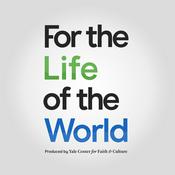Mortality, fragility, forgiveness, and peace. Journalist and author Stan Grant offers a genre-bending work of prayer, memory, and theology shaped by fatherhood, Aboriginal inheritance, masculinity, and mortality.
“I see this as a gift from God, a creator that allows us to find each other again.”
In this conversation with Evan Rosa, Grant reflects on his 2025 book, Murriyang: Song of Time—his philosophical and spiritual exploration of the human place in the world and faith as lived experience rather than abstraction. He looks closely at his father’s life in order to come to terms with his own, the meaning of fatherhood and how to understand and forgive our fathers, masculinity and vulnerability, Aboriginal history and identity, masculinity and vulnerability, forgiveness and sacrifice, prayer and poetry, and the whole human experience of time and eternity.
Episode Highlights
“We inherit our father’s cups.”
“We must forgive our fathers. It is the only way that we can forgive ourselves.”
“We cannot survive without each other.”
“Man is not made for history. History is made for man.”
“ … to confront the beauty of that mortality—my father’s final gift to me is his death.”
About Stan Grant
Stan Grant is an Australian journalist, author, and public intellectual of Wiradjuri, Kamilaroi, and Dharawal heritage. A former international correspondent and broadcaster, he has written widely on Indigenous identity, history, faith, and moral responsibility. Grant is the author of several acclaimed books, including Talking to My Country and Murriyang: Song of Time, which blends prayer, memoir, poetry, and theology. His work consistently resists abstraction in favor of embodied human experience, emphasizing forgiveness, attention, and the dignity of the human person. Grant has received national honors for journalism and cultural leadership and remains a leading voice in conversations about history, masculinity, faith, and what it means to live lives worthy of our shared humanity.
Helpful Links and Resources
Murriyang: Song of Time https://www.harpercollins.com.au/9781460763827/murriyang/
Talking to My Country https://www.harpercollins.com.au/9781460752210/talking-to-my-country/
Stan Grant official website https://www.stangrant.com.au
Show Notes
Fathers and sons; inherited burden, sacrifice, and responsibility
“We inherit our father’s cups”
Christ in Gethsemane as archetype of father-son suffering
Masculinity as physical burden, scars, toughness
“We must forgive our fathers. It is the only way that we can forgive ourselves and live in a world of forgiveness with the other.”
Yindyamarra: respect, gentleness, quietness, forgiveness
Improvisation and rehearsal; jazz as spiritual and artistic model
“I have never written a second draft.”
Second thought as artifice, hiding, dishonesty
Forgiveness of self before speaking; imperfection and risk
“If silence is violence, then we have redefined the very nature of violence itself.”
Giftedness of life; what is given and received
Gift exchange versus transaction in modern society
“We offer the gift of ourselves to each other.”
Murriyang as Psalter, prayer, song, contemplation of time and God
Reading slowly; opening anywhere; shelter from modern noise
“We cannot survive without each other.”
One-person performance; no script, immediacy, intimacy
Music, poetry, time, mortality woven together
Father’s body as history; sawmills, injuries, exhaustion
Childhood memory of bath; “the water is stained black with blood”
Mother’s touch; tenderness amid survival
Late-life renaissance; language recovery, teaching, honors
Murriyang (heaven) and Babiin (father) liturgical, prayerful, dialogical alternation throughout the text
St. Augustine: “What was God doing before he made time? He was making hell for the over-curious.”
Is God in time? Or out of time?
Speaking of eternity or timelessness still imputes the concept of time.
“ The imaginative space of time itself, it reaches to an horizon. But what is beyond the horizon? For modernity, of course, time is the big story. To be modern is to reinvent time. It's to be new. Modernity and technology is all about taming time.”
“Man is not made for history. History is made for man.”
Attention, affliction, abstraction, and the loss of human touch
“My father’s gift to me is his death.”
Mortality as meaning; resisting transhumanism
Time, modernity, instant life, collapsing space
Fragility, love, forgiveness, and beginning again
Ending where we began
#StanGrant
#Murriyang
#Fatherhood
#Masculinity
#Forgiveness
#TimeAndFaith
#HumanFlourishing
#Australia
Production Notes
This podcast featured Stan Grant
Edited and Produced by Evan Rosa
Hosted by Evan Rosa
Production Assistance by Noah Senthil
A Production of the Yale Center for Faith & Culture at Yale Divinity School https://faith.yale.edu/about
Support For the Life of the World podcast by giving to the Yale Center for Faith & Culture: https://faith.yale.edu/give



